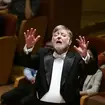The Full Works Concert - Monday 12 August: Beethoven
The Great Composers month on the Full Works Concert continues with possibly the greatest of them all - Ludwig van Beethoven.
Tonight Jane Jones presents a Great Composers Full Works Concert featuring three of Beethoven's most famous works - and a musical novelty dedicated to Britain's Prince Regent.
The concert opens with Beethoven's Symphony No.5 in C minor, one of the most popular and best-known compositions in all classical music, and one of the most frequently played symphonies. It was first performed in Vienna in 1808 and immediately grabbed the audience's attention with its distinctive four-note da-da-da-daah motif. The symphony and that motif in particular, are universally known, appearing frequently in popular culture, from disco to rock and roll, to appearances in film and TV.
Beethoven composed the Moonlight Sonata in the summer of 1801 in Hungary, on an estate belonging to the Brunswick family. It was dedicated to Beethoven’s pupil and passion, 17-year-old Countess Giulietta Gucciardi. The title was given to it by the poet Ludwig Rellstab who, in 1832, was inspired on a moonlit night on the banks of the Lucerne River. The image probably has no connection with Beethoven’s intentions. For Beethoven it may not have been an evocation of a romantic moonlit night at all but rather of a solemn funeral hymn.
Wellington's Victory is a short orchestral work that Beethoven composed to commemorate the Duke of Wellington's victory over Joseph Bonaparte at the Battle of Vitoria in Spain on 21 June 1813. Beethoven dedicated the work to the British Prince Regent, later King George IV. It was first performed in Vienna at a concert with Beethoven conducting, in aid of wounded Austrian and Bavarian soldiers. The work was an immediate crowd-pleaser with its simulation of opposing armies and battle scenes. Listen out also for hints of Rule Britannia, God Save the King and For He's a Jolly Good Fellow!
On the same night that Wellington's Victory was first played, Beethoven also premiered his mighty Symphony No.7 in A major. It is a magnificent work in which Beethoven unveiled a number of new approaches to orchestral writing that would have a lasting influence on 19th century music. Wagner described the symphony as 'the apotheosis of the Dance in its highest aspect ... the loftiest deed of bodily motion incorporated in an ideal world of tone.' The Allegretto movement - now known from its use in The King's Speech - was such a success at the symphony's premiere that the movement was immediately encored.
Beethoven: Symphony No.5 in C minor
Claudio Abbado conducts the Berlin Philharmonic Orchestra
Beethoven: Piano Sonata No.14 in C sharp minor (‘Moonlight’)
Piano: Nelson Freire
Beethoven: Wellington’s Victory
Neville Marriner conducts the Academy of St. Martin in the Fields
Beethoven: Symphony No.7 in A major
Charles Mackerras conducts the Scottish Chamber Orchestra













